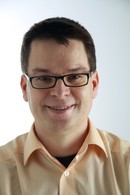Jochen Schieck (EPS Invited Speaker): "Particle Physics – three years after the discovery of the Higgs"
"With the discovery of the Higgs-Boson in 2012 all particles of the Standard Model of Particle Physics have been discovered. All particle physics measurements are consistent with predictions, however, we know that the Standard Model can only be an effective theory. The theory does not contain gravity, the intrinsic CP-violation is not enough to describe the observed matter-antimatter asymmetry in the universe and it doesn’t contain a particle candidate for Dark Matter. I will briefly review the status of the Standard Model of particle physics and it’s key measurements, including the discovery of the Higgs-Boson at CERN. The open questions of modern particle physics will be presented, theoretical scenarios which could solve this problems discussed and the experimental program summarised, including latest results from the restart of the LHC in 2015. Education and outreach is an important task of the international particle physics community. A variety of tools is available to explain students the main concepts of particle physics and, even more important, give them an idea how research in this field is performed. I will show some of these tools and will present so-called hands-on exercises for students."
Jochen Schieck studied physics at the University of Heidelberg between 1992 and 1996. In 1999, he received his PhD from the University of Heidelberg working on the OPAL-experiment at CERN. After research stay in the USA, working at the Babar-Experiment at the Stanford Linear Accelerator Centre he moved back to Germany, working for several years at the Max Planck Institute for Physics. There he joined the ATLAS experiment, one of the two multi-purpose experiments at the Large Hadron Collider at CERN, which discovered the Higgs particle in 2012. In 2010, he was appointed as professor at the Ludwig-Maximilians-Universität in Munich and in 2013, he moved as director to the Institute for High Energy Physics of the Austrian Academy of Sciences. He is also full professor at the Vienna University of Technology. He is a principle investigator of the cluster of excellence “Origin and Structure of Universe” and received funding from the BMBF for the Belle II project. Currently he focuses on resolving the particle nature of Dark Matter, but he is also still involved at the Large Hadron Collider at CERN and at the Belle II experiment in Japan.
Jochen Schieck is invited by the European Physical Society (EPS).


